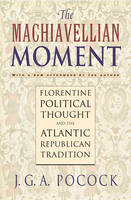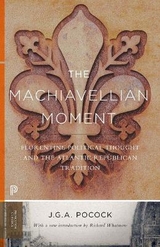
The Machiavellian Moment
Florentine Political Thought and the Atlantic Republican Tradition
Seiten
2003
|
Revised edition
Princeton University Press (Verlag)
978-0-691-11472-9 (ISBN)
Princeton University Press (Verlag)
978-0-691-11472-9 (ISBN)
- Titel erscheint in neuer Auflage
- Artikel merken
Zu diesem Artikel existiert eine Nachauflage
A study of the consequences for modern historical and social consciousness of the ideal of the republic revived by Machiavelli and other thinkers of Renaissance Italy. This work suggests that Machiavelli's emphasis was on the moment in which the republic confronts the problem of its instability in time, which he calls the "Machiavellian moment."
The Machiavellian Moment is a classic study of the consequences for modern historical and social consciousness of the ideal of the classical republic revived by Machiavelli and other thinkers of Renaissance Italy. J.G.A. Pocock suggests that Machiavelli's prime emphasis was on the moment in which the republic confronts the problem of its own instability in time, and which he calls the "Machiavellian moment." After examining this problem in the thought of Machiavelli, Guicciardini, and Giannotti, Pocock turns to the revival of republican thought in Puritan England and in Revolutionary and Federalist America. He argues that the American Revolution can be considered the last great act of civic humanism of the Renaissance. He relates the origins of modern historicism to the clash between civic, Christian, and commercial values in the thought of the eighteenth century.
The Machiavellian Moment is a classic study of the consequences for modern historical and social consciousness of the ideal of the classical republic revived by Machiavelli and other thinkers of Renaissance Italy. J.G.A. Pocock suggests that Machiavelli's prime emphasis was on the moment in which the republic confronts the problem of its own instability in time, and which he calls the "Machiavellian moment." After examining this problem in the thought of Machiavelli, Guicciardini, and Giannotti, Pocock turns to the revival of republican thought in Puritan England and in Revolutionary and Federalist America. He argues that the American Revolution can be considered the last great act of civic humanism of the Renaissance. He relates the origins of modern historicism to the clash between civic, Christian, and commercial values in the thought of the eighteenth century.
J.G.A. Pocock is Professor Emeritus of History at Johns Hopkins University. His books include "The Political Works of James Harrington; Virtue, Commerce and History; Barbarism and Religion, I: The Enlightenments of Edward Gibbon;" and "Barbarism and Religion, II: Narratives of Civil Government".
| Erscheint lt. Verlag | 16.2.2003 |
|---|---|
| Verlagsort | New Jersey |
| Sprache | englisch |
| Maße | 152 x 235 mm |
| Gewicht | 907 g |
| Themenwelt | Geisteswissenschaften ► Philosophie |
| Sozialwissenschaften ► Politik / Verwaltung ► Politische Theorie | |
| Sozialwissenschaften ► Politik / Verwaltung ► Staat / Verwaltung | |
| ISBN-10 | 0-691-11472-2 / 0691114722 |
| ISBN-13 | 978-0-691-11472-9 / 9780691114729 |
| Zustand | Neuware |
| Haben Sie eine Frage zum Produkt? |
Mehr entdecken
aus dem Bereich
aus dem Bereich
ein Vortrag
Buch | Softcover (2024)
Suhrkamp (Verlag)
10,00 €



